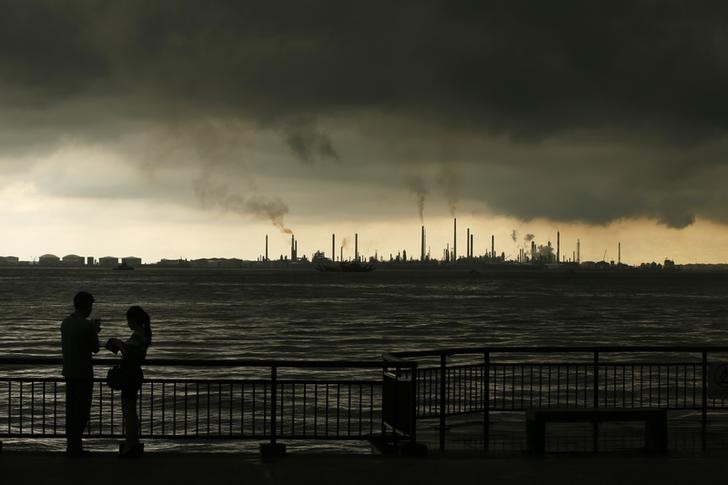By Koustav Samanta
SINGAPORE, Nov 21 (Reuters) - Oil prices retreated on
Thursday as a spat over Hong Kong added to worries of a delay in
any U.S.-China trade deal, after posting steep gains in the
previous session on bullish U.S. crude inventory data.
The trade war between the world's two biggest economies has
dominated the outlook for future oil demand, and trade experts
have warned the completion of a "phase one" U.S.-China trade
deal could slip into next year.
Brent crude futures LCOc1 fell 25 cents, or 0.4%, to
$62.15 a barrel by 0138 GMT. The international benchmark rose
2.5% on Wednesday.
West Texas Intermediate (WTI) crude futures CLc1 dropped
20 cents, or 0.4%, to $56.81 per barrel. U.S. crude closed up
3.4% in the previous session.
"The trade talks are driving prices. I think you can draw a
straight line vector between the price of oil and sentiment
around trade," said Stephen Innes, market strategist at
AxiTrader.
"I view the (U.S.-China) deal as massive. A trade deal would
allow held-back business investment decisions to move forward
and possibly turn around the faltering momentum in Indian oil
import demand, which could soak up a large portion of the supply
glut."
Among the latest trade row hurdles, China condemned a U.S.
Senate bill aimed at protecting human rights in Hong Kong, while
U.S. President Donald Trump said he is inclined to raise tariffs
on Chinese imports if a trade deal is not reached. A big drawdown of crude stocks at the U.S. delivery hub of
Cushing, Oklahoma, however, propelled oil prices higher on
Wednesday.
Crude stocks at the Cushing fell by 2.3 million barrels,
while U.S. crude inventories rose by 1.4 million barrels in the
week to Nov. 15, compared with expectations for an increase of
1.5 million barrels, data from the Energy Information
Administration showed. Russian President Vladimir Putin said on Wednesday that
Russia and OPEC have 'a common goal' of keeping the oil market
balanced and predictable, and Moscow will continue cooperation
under the global supply curbs deal. The Organization of the Petroleum Exporting Countries (OPEC)
meets on Dec. 5 in Vienna, followed by talks with a group of
other exporters, including Russia, known as OPEC+.
- English (USA)
- English (UK)
- English (India)
- English (Canada)
- English (Australia)
- English (South Africa)
- English (Nigeria)
- Deutsch
- Español (España)
- Español (México)
- Français
- Italiano
- Nederlands
- Português (Portugal)
- Polski
- Português (Brasil)
- Русский
- Türkçe
- العربية
- Ελληνικά
- Svenska
- Suomi
- עברית
- 日本語
- 한국어
- 简体中文
- 繁體中文
- Bahasa Indonesia
- Bahasa Melayu
- ไทย
- Tiếng Việt
- हिंदी
Oil dips on worries U.S.-China trade deal could slip to next year
Published 11/21/2019, 09:46 AM
Updated 11/21/2019, 09:56 AM
Oil dips on worries U.S.-China trade deal could slip to next year

Latest comments
Install Our App
Risk Disclosure: Trading in financial instruments and/or cryptocurrencies involves high risks including the risk of losing some, or all, of your investment amount, and may not be suitable for all investors. Prices of cryptocurrencies are extremely volatile and may be affected by external factors such as financial, regulatory or political events. Trading on margin increases the financial risks.
Before deciding to trade in financial instrument or cryptocurrencies you should be fully informed of the risks and costs associated with trading the financial markets, carefully consider your investment objectives, level of experience, and risk appetite, and seek professional advice where needed.
Fusion Media would like to remind you that the data contained in this website is not necessarily real-time nor accurate. The data and prices on the website are not necessarily provided by any market or exchange, but may be provided by market makers, and so prices may not be accurate and may differ from the actual price at any given market, meaning prices are indicative and not appropriate for trading purposes. Fusion Media and any provider of the data contained in this website will not accept liability for any loss or damage as a result of your trading, or your reliance on the information contained within this website.
It is prohibited to use, store, reproduce, display, modify, transmit or distribute the data contained in this website without the explicit prior written permission of Fusion Media and/or the data provider. All intellectual property rights are reserved by the providers and/or the exchange providing the data contained in this website.
Fusion Media may be compensated by the advertisers that appear on the website, based on your interaction with the advertisements or advertisers.
Before deciding to trade in financial instrument or cryptocurrencies you should be fully informed of the risks and costs associated with trading the financial markets, carefully consider your investment objectives, level of experience, and risk appetite, and seek professional advice where needed.
Fusion Media would like to remind you that the data contained in this website is not necessarily real-time nor accurate. The data and prices on the website are not necessarily provided by any market or exchange, but may be provided by market makers, and so prices may not be accurate and may differ from the actual price at any given market, meaning prices are indicative and not appropriate for trading purposes. Fusion Media and any provider of the data contained in this website will not accept liability for any loss or damage as a result of your trading, or your reliance on the information contained within this website.
It is prohibited to use, store, reproduce, display, modify, transmit or distribute the data contained in this website without the explicit prior written permission of Fusion Media and/or the data provider. All intellectual property rights are reserved by the providers and/or the exchange providing the data contained in this website.
Fusion Media may be compensated by the advertisers that appear on the website, based on your interaction with the advertisements or advertisers.
© 2007-2024 - Fusion Media Limited. All Rights Reserved.